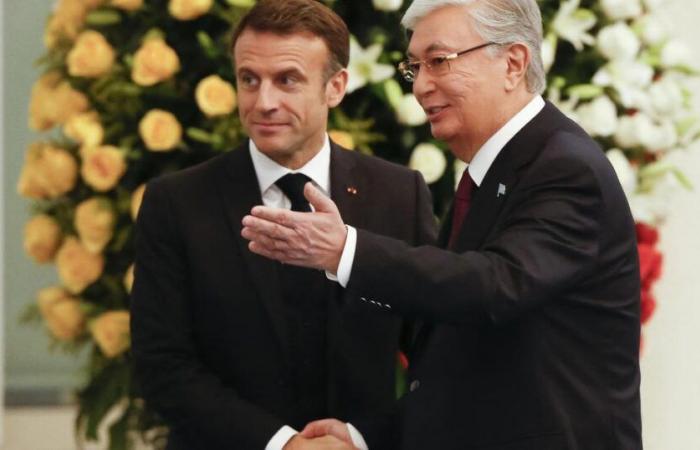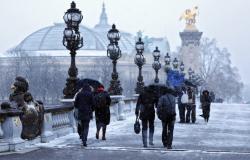
FIGAROVOX/TRIBUNE – After having completed the construction of a first nuclear power plant, Kazakhstan can place itself in support of the French nuclear industry, affirms its president, Kassym-Jomart Tokaïev, on a state visit to Paris on Tuesday November 5.
Kassym-Jomart Tokayev is the President of the Republic of Kazakhstan.
It is clear that the modern world is becoming more and more unpredictable and finds itself in a situation of unprecedented turbulence and geopolitical polarization. The situation is complicated by two major global challenges: the rapid increase in global warming and mass migratory movements. These mutually reinforcing factors have devastating consequences that affect millions of citizens around the world.
However, existing governance systems and international response mechanisms are not sufficiently effective in such crises. It is particularly worrying that multilateral institutions are also increasingly in an impasse. The case of the UN is obviously the most emblematic of this crisis. This organization, originally conceived as a symbol of global solidarity, remains essential today, faced with serious difficulties.
The traditional superpowers, economic and political behemoths, do not agree on the major issues of the moment. The consequences of this discord are felt particularly in areas where conflicts are bogged down, while the structures designed to resolve these disagreements, first and foremost the United Nations, are paralyzed.
We must therefore accept that the frame of reference has changed, and rethink multilateralism. One of the key aspects of the new reality is the recognition of the growing role of the group of middle powers. The economic and political importance of these countries is increasing and their balanced and constructive positioning becomes an advantage in global uncertainty. With great powers unable to reach consensus, it is middle powers that are increasingly taking on the role of mediator, supporting opportunities for dialogue and maintaining a commitment to global cooperation.
We intend to work with France, which enjoys indisputable authority on the international scene and extensive diplomatic experience.
Kassym-Jomart Tokayev
For many years, Kazakhstan has actively pursued a balanced foreign policy and participated in promoting diplomatic initiatives around the world. The new status of middle power indeed gives our country a great responsibility in accomplishing this important mission.
Faced with current challenges and the increasing risks of conflict, Kazakhstan supports peace processes and intercivilizational dialogue. By providing a negotiating platform to Azerbaijan and Armenia around the peace treaty, we fully support the aspirations of the two countries to open a new page in their relations. Astana has also hosted peace talks on Syria and also served as a platform for multilateral discussions on Iran's nuclear program. Finally, we regularly organize conferences of religious leaders which serve as exceptional venues for promoting interfaith dialogue. All these actions reflect our common values of solidarity, equality and peace, key principles that we share with France.
On the national level we have put in place a solid democratic governance system and we are actively developing sectors of the future such as green energy, digital technology and logistics, particularly in close collaboration with French companies. When it comes to the environment, we are firmly committed to the global climate agenda and strongly support the Paris Agreement, reaffirming our commitment to the planet and future generations. Our goal of achieving carbon neutrality by 2060 is further proof of Kazakhstan’s consistent achievement of the Sustainable Development Goals.
We are delighted, alongside President Emmanuel Macron, to lead the One Water Summit initiative which will be held next December to strengthen cooperation on all issues linked to water resources, with the aim of reaching the most vital of UN Sustainable Development Goals: “clean water and sanitation for all”. Furthermore, our firm attachment to the principle of good neighborliness allows us to develop intra-regional integration through platforms such as the “Middle Corridor”, a strategic project linking Asia and Europe via Kazakhstan and the sea. Caspian. It’s not just about expanding trade routes; it is about strengthening a spirit of collaboration that promotes mutually beneficial economic ties between different regions. Such efforts are essential to the energy security of Europe and France, an important issue in our bilateral relationship. Kazakhstan, the world's leading producer of natural uranium, intends to remain a reliable partner for the French nuclear industry.
Also read
Iraq, Egypt, Kazakhstan: when Bruno Retailleau plays diplomat on the immigration front
During President Macron's visit to Astana last November, our countries expressed their mutual interest in developing cooperation in the fields of rare earth metals, renewable energies and civil nuclear energy, which opens up opportunities for new perspectives for expanding our strategic partnership.
The positive outcome of the recent national referendum on the construction of the first nuclear power plant in independent Kazakhstan lays a solid foundation for mutually beneficial cooperation in the future. There is no doubt that it will also contribute to strengthening global energy security. This is of paramount importance in a current context of turbulence. This is why it is essential that middle powers such as Kazakhstan use all their capabilities to promote multilateral dialogue and ensure global and regional stability.
Kazakhstan, which has always pursued a proactive, pragmatic and balanced foreign policy, intends to continue to actively contribute to this process by strengthening cooperation with all states. We intend to work with France, which enjoys indisputable authority on the international scene and extensive diplomatic experience. Together, we can help build a stable and prosperous world, ensuring safe coexistence, mutually beneficial cooperation and progress for all. It is with this vision that, at the invitation of the President of the French Republic, I am making my state visit to Paris, the first in the history of our relations.





